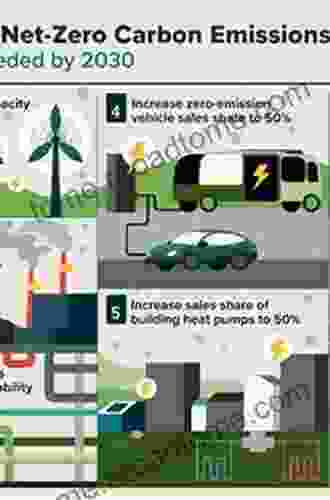Potential and Challenges of Low Carbon Fuels for Sustainable Transport Energy

5 out of 5
| Language | : | English |
| File size | : | 29273 KB |
| Text-to-Speech | : | Enabled |
| Screen Reader | : | Supported |
| Enhanced typesetting | : | Enabled |
| Print length | : | 560 pages |
The transportation sector plays a significant role in global energy consumption and greenhouse gas emissions. Transitioning to low carbon fuels is crucial for mitigating climate change and creating a sustainable future for transport energy. This article delves into the potential and challenges of low carbon fuels, exploring their environmental benefits, economic implications, and the obstacles to their widespread adoption.
Environmental Benefits of Low Carbon Fuels
- Reduced Greenhouse Gas Emissions: Low carbon fuels emit significantly lower levels of carbon dioxide (CO2) and other greenhouse gases (GHGs) compared to conventional fossil fuels. This contributes to reducing air pollution and mitigating the effects of climate change.
- Improved Air Quality: Low carbon fuels produce fewer harmful pollutants such as particulate matter (PM),nitrogen oxides (NOx),and sulfur oxides (SOx). This improves air quality, reducing the risk of respiratory and cardiovascular diseases.
- Energy Security: Low carbon fuels can reduce dependence on fossil fuels, which are often subject to price volatility and geopolitical uncertainties. Diversifying the energy supply through low carbon fuels enhances energy security and resilience.
Economic Implications of Low Carbon Fuels
- Job Creation: The development and deployment of low carbon fuels can stimulate job creation in various sectors, including research and development, manufacturing, and infrastructure. It fosters innovation and economic growth.
- Reduced Fuel Costs: In the long run, low carbon fuels can offer cost savings compared to conventional fossil fuels. As technology advances and production scales up, the costs of low carbon fuels are expected to decline.
- Energy Independence: Transitioning to low carbon fuels can reduce reliance on imported fossil fuels, which can lead to significant economic benefits. Countries with abundant renewable energy resources can become net exporters of low carbon fuels.
Challenges to Widespread Adoption of Low Carbon Fuels
- High Production Costs: Currently, the production costs of low carbon fuels are often higher than conventional fossil fuels. This is a major barrier to their widespread adoption.
- Infrastructure Limitations: The transition to low carbon fuels requires significant investments in infrastructure, such as charging stations for electric vehicles and hydrogen refueling stations. This can be a challenge, especially in developing countries.
- Consumer Acceptance: Changing consumer behavior and overcoming resistance to new technologies can be an obstacle to the adoption of low carbon fuels. There may be concerns about range anxiety for electric vehicles or safety perceptions surrounding hydrogen fuel cells.
- Policy and Regulatory Barriers: A lack of clear and supportive policy frameworks can hinder the investment and deployment of low carbon fuels. Incentives, regulations, and standards are needed to encourage their adoption.
Overcoming the Challenges
Overcoming the challenges to the widespread adoption of low carbon fuels requires a multi-faceted approach:
- Technological Advancements: Continued research and development efforts are crucial to reduce production costs and improve the efficiency of low carbon fuels.
- Infrastructure Development: Governments and private sector actors need to collaborate to invest in infrastructure that supports the use of low carbon fuels.
- Consumer Education and Outreach: Public awareness campaigns and educational initiatives can help overcome consumer resistance and promote the benefits of low carbon fuels.
- Supportive Policy Frameworks: Policymakers should implement incentives, such as tax breaks and subsidies, to encourage the adoption of low carbon fuels. Regulations can also be used to set emission standards and promote the development of low carbon energy infrastructure.
Industry Perspectives and Policy Strategies
The transportation industry is increasingly recognizing the need to transition to low carbon fuels. Leading companies are investing in research and development, and partnerships are forming to accelerate the deployment of low carbon technologies. Governments worldwide are also adopting ambitious policies to promote sustainable transport energy. For example, the European Union has set a target to reduce transport emissions by 90% by 2050, while California has mandated that all new passenger vehicles sold in the state be zero-emission vehicles by 2035.
Low carbon fuels hold immense potential for decarbonizing the transportation sector and creating a sustainable future for transport energy. However, significant challenges need to be overcome to achieve widespread adoption. Through technological advancements, infrastructure development, consumer education, and supportive policy frameworks, we can unlock the potential of low carbon fuels and pave the way for a cleaner, more sustainable transportation system.
5 out of 5
| Language | : | English |
| File size | : | 29273 KB |
| Text-to-Speech | : | Enabled |
| Screen Reader | : | Supported |
| Enhanced typesetting | : | Enabled |
| Print length | : | 560 pages |
Do you want to contribute by writing guest posts on this blog?
Please contact us and send us a resume of previous articles that you have written.
 Book
Book Novel
Novel Page
Page Chapter
Chapter Text
Text Story
Story Genre
Genre Reader
Reader Library
Library Paperback
Paperback E-book
E-book Magazine
Magazine Newspaper
Newspaper Paragraph
Paragraph Sentence
Sentence Bookmark
Bookmark Shelf
Shelf Glossary
Glossary Bibliography
Bibliography Foreword
Foreword Preface
Preface Synopsis
Synopsis Annotation
Annotation Footnote
Footnote Manuscript
Manuscript Scroll
Scroll Codex
Codex Tome
Tome Bestseller
Bestseller Classics
Classics Library card
Library card Narrative
Narrative Biography
Biography Autobiography
Autobiography Memoir
Memoir Reference
Reference Encyclopedia
Encyclopedia Tori Spelling
Tori Spelling Rhoney Gissen Stanley
Rhoney Gissen Stanley Jack Wellman
Jack Wellman Magdalena Diering
Magdalena Diering Liz Climo
Liz Climo Julie De Azevedo Hanks
Julie De Azevedo Hanks Rebecca Olien
Rebecca Olien Jennifer Cut
Jennifer Cut Betsy Miller
Betsy Miller Ben Gaunt
Ben Gaunt Lora Cipriano
Lora Cipriano Baron Wolman
Baron Wolman Bart Potter
Bart Potter Yogi Ramacharaka
Yogi Ramacharaka Rachel Safier
Rachel Safier Bonnie J Addario
Bonnie J Addario Benjamin K Sovacool
Benjamin K Sovacool Bethany Webb
Bethany Webb Carl Abrahamsson
Carl Abrahamsson Asker Jeukendrup
Asker Jeukendrup
Light bulbAdvertise smarter! Our strategic ad space ensures maximum exposure. Reserve your spot today!
 Forrest BlairFollow ·7.4k
Forrest BlairFollow ·7.4k Tennessee WilliamsFollow ·15.4k
Tennessee WilliamsFollow ·15.4k John GrishamFollow ·19.6k
John GrishamFollow ·19.6k Harvey BellFollow ·19.7k
Harvey BellFollow ·19.7k Gregory WoodsFollow ·7k
Gregory WoodsFollow ·7k Haruki MurakamiFollow ·18k
Haruki MurakamiFollow ·18k Edward BellFollow ·15.2k
Edward BellFollow ·15.2k Gary ReedFollow ·19.8k
Gary ReedFollow ·19.8k

 Corey Hayes
Corey HayesEasy Delicious Recipes To Heal The Immune System And...
: The Cornerstone...

 Cody Russell
Cody RussellMastering Medical Terminology: A Comprehensive Guide for...
Navigating the...

 Ibrahim Blair
Ibrahim BlairBeat Cancer Symptoms: Your Essential Guide to Symptom...
Are you struggling with the debilitating...

 Finn Cox
Finn CoxHow to Be the Best at Work and Still Have Time to Play:...
Are you tired...
5 out of 5
| Language | : | English |
| File size | : | 29273 KB |
| Text-to-Speech | : | Enabled |
| Screen Reader | : | Supported |
| Enhanced typesetting | : | Enabled |
| Print length | : | 560 pages |
















